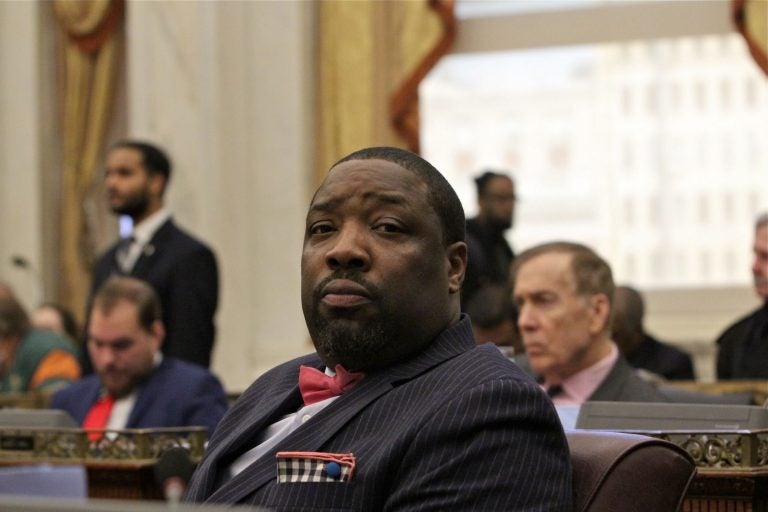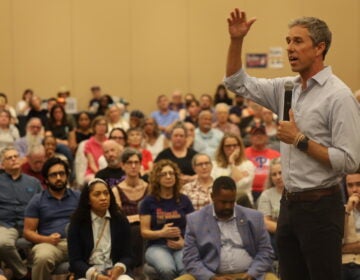Why Philly can’t quit the tradition at the center of FBI’s Kenyatta Johnson case
Council continues to support councilmanic prerogative despite federal prosecutors’ explicit mention of the unofficial policy in the case against the South Philly councilman
Listen 1:30
Philadelphia City Council member Kenyatta Johnson (Emma Lee/WHYY)
The day after federal prosecutors leveled corruption charges against Councilmember Kenyatta Johnson, he showed up at City Hall for work as usual.
In a speech to his fellow members, he apologized for the inconvenience his indictment may have caused and thanked them for their words of support.
“I think it’s unfortunate based on these overreaching circumstances, it’s put some of my colleagues who are doing great work in a precarious position,” said Johnson, who has proclaimed his innocence and vowed to fight the charges. “Nevertheless, our work must move forward.”
Prosecutors allege that Johnson abused a controversial local tradition known as councilmanic prerogative for financial gain. The term describes a long-held City Council practice in which members defer to district representatives on localized matters — such as city land sales and the zoning and land use decisions at the center of the case against Johnson and his wife, Dawn Chavous.
The two federal bribery charges against Johnson and his wife revolve around zoning bills regarding South Philadelphia properties owned by Universal Cos., the Philadelphia development and charter school nonprofit founded by music legend Kenny Gamble.
At the core of the case, prosecutors allege that Universal offered Chavous more than $66,000 in consulting work in return for her husband’s help in preserving the nonprofit’s ownership of several valuable pieces of real estate. One of those properties, the historic Royal Theater, was later sold, allegedly to pay off Universal’s debts.

Members of City Council continue to support councilmanic prerogative, despite consistent calls for reform from outside experts who say the tradition enables the exact kind of abuse alleged Wednesday by prosecutors.
“Basically, this [allegation] is the worst-case scenario of councilmanic prerogative — it’s overriding public interest,” said Akira Rodriguez, who is a professor of urban planning at the University of Pennsylvania.
A 2015 Pew report on the practice noted that councilmanic prerogative was at the heart of many of the high-profile federal indictments that City Council has faced since the infamous Abscam case.
“Although nothing improper happens in the vast majority of cases, it is worth noting that council’s control over land use played a role in the cases of all six council members convicted of wrongdoing since 1981,” the report reads.
Even so, City Council President Darrell Clarke and other members, including Johnson, worked to preserve the practice last year while reforming the city’s process for selling vacant land in the wake of scandals.
But now a bigger scandal has erupted. One that could land Johnson and his wife in jail for decades. Yet the indictment didn’t appear to change anyone’s position.
On Thursday, councilmembers defended the practice as a means to ensure that city residents — the constituents who elect them — retain power over developments that can affect their quality of life.
Cherelle Parker, recently elected majority leader of the Democrats on City Council, said that anyone who would criticize prerogative should do a poll of her constituents and see how they feel about the practice.
She cited a recent case in which she intervened to head off a medical marijuana dispensary in her district.
“I encourage any journalist to ask residents of my district who were advocating around a medical marijuana facility that would have required some additional zoning on Stenton Avenue, which is a residential community,” said Parker. “My only tool, my only vehicle, was the land use process to protect the community at large, who demanded I stand up.”
The alternative proposed to councilmanic prerogative is to leave such decisions to professional planners and ensure, through regulations, that robust community outreach and engagement precedes decisions. Under the current system, the Philadelphia City Planning Commission acts in a purely advisory role, without the power of a legislator.
But Councilmembers argue that’s the way it should be. As politicians, they can more easily be held accountable.
“When you have a bureaucrat making these decisions, they don’t have to answer to anybody,” said Councilmember Mark Squilla. “Who would you rather have representing you, someone you can vote for or against every four years, or someone over whom you have no say, and they can do whatever they want?”
Philadelphia’s district council members are rarely challenged in a meaningful way in either primary or general elections, however. Neither Squilla nor Parker faced any real competitor in reelection bids in 2019. Johnson won his last three elections squarely, despite challengers in the last two primaries.
The only district council member who did lose re-election last year was West Philadelphia incumbent Jannie Blackwell, who was defeated in part because of voter concern over her handling of land use issues.
Jamie Gauthier now holds that seat, and she has complicated feelings about the tradition of councilmanic prerogative.
“When you have this tradition where you are almost solely abdicating issues around land use and land disposition and zoning to one person, I think it’s kind of ripe for misuse or even just the appearance of misuse,” said Gauthier.
District members’ opinions should be heavily weighted in such decisions, Gauthier said, because they know their areas the best. But she said that the city needs a stronger check on councilmanic prerogative, especially when it comes to major decisions like the city’s plan for 4601 Market St. in her district. There, a major land deal was mysteriously held up for months by her predecessor — at the behest of a developer ally, it turned out.
“I think the administration has to provide a check on proving why these recommendations are made, especially when you are dealing with donors or family members who might have connections with parties involved in projects,” said Gauthier.
Councilmember Helen Gym earned headlines recently when she flouted prerogative by voting against bans on food vendors. She called for reform of the tradition long before Johnson’s indictment, though she has never called for its abolition. Thursday, she again called on city government to take action.
“I do think that the city has ceded its authority to council, which isn’t equipped to review every single small thing that goes through a councilmanic district,” said Gym. “It is incumbent on the city to enact a set of rules that could balance out any concerns about overextension in any particular area.”
One factor in the council’s overall resistance to change may come down to campaign war chests. Real estate developers are one of the largest donor groups to City Councilmembers, and their business interests often depend on favorable zoning and land disposition.
For his part, Councilmember Johnson told reporters that he did nothing wrong, and that the indictment won’t change how he approached his job.
Johnson was recently appointed to chair the Rules Committee, which oversees zoning legislation. Councilmember Bobby Henon was appointed to chair the Licenses and Inspections Committee, even though he was indicted last year, in part, for allegedly abusing the Department of Licenses and Inspections to punish political foes.
“I’m going to continue working on behalf of the people,” said Johnson, when asked if the case would change his legislative approach to zoning issues. “I’ve always worked in decency and transparency, and I will continue to work that way.”
WHYY is your source for fact-based, in-depth journalism and information. As a nonprofit organization, we rely on financial support from readers like you. Please give today.







